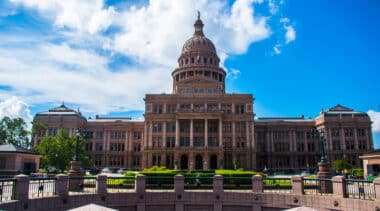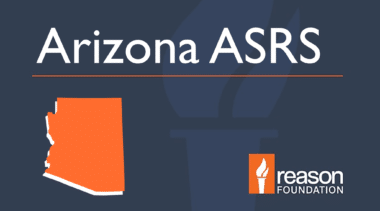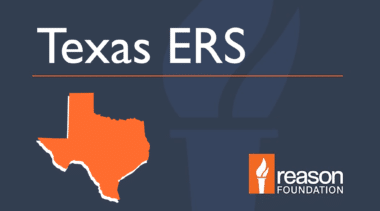Zachary Christensen is a Managing Director of Reason Foundation's Pension Integrity Project.
Christensen’s work with Reason's Pension Integrity Project aims to promote solvent, sustainable retirement systems that provide retirement security for government workers while reducing long term costs for taxpayers and employees. Zachary and his team provides education, reform policy options, and actuarial analysis for policymakers and stakeholders to help them design reform proposals that are practical and viable.
The Pension Integrity Project has provided technical assistance to several successful pension reform efforts in recent years, including in Michigan, Colorado, Arizona, South Carolina, Texas and other states tackling persistent pension solvency challenges.
Christensen has contributed to in-depth solvency analysis of the Arizona PSPRS, Arkansas TRS, Louisiana TRSL, Texas ERS, and Texas TRS pension plans.
Christensen's work has been published in the Los Angeles Daily News, Orange County Register, NJ.com, Colorado Politics, and many other publications. He has also been featured in the Carolina Journal and the Michigan Capitol Confidential. His research has been published by the Hoover Institution, The Platte Institute, Texas Public Policy Foundation, and Rio Grande Foundation.
Prior to joining Reason Foundation, Christensen was a pension finance analyst at Stanford University’s Hoover Institution, where he worked on widely-cited research on the funding status and accounting methods for public sector retirement systems.
Christensen holds an M.S. in Public Policy from Pepperdine University and a B.S. in Political Science from Brigham Young University.
-
Analysis of Texas Senate Bill 321
Senate Bill 321 could save the state as much as $15 billion in long term costs and ensure that new employees' retirement benefits are fully funded.
-
Pension Reform Newsletter: Using Marijuana Revenue to Pay Pension Debt, Pension Reforms in Florida and North Dakota, and More
Plus, analysis on the factors that impact state-level pension reforms and how to better protect public workers from retirement risks.
-
Nebraska’s Growing Municipal Pension Funding Challenges
Omaha and Lincoln have made progress in addressing pension issues in recent years, but unfunded liabilities are likely to continue to grow and harm city finances.
-
California’s Pension Debt Takes Money From Classrooms and Students
The rising cost of pension debt crowds out the education budget, diverting funds away from classrooms.
-
Teacher Retirement System of Texas Solvency Analysis
Investment returns failing to meet unrealistic expectations have been the largest contributor to the public pension plan's unfunded liabilities, adding over $30 billion in debt since 2001.
-
Arizona Public Safety Personnel Retirement System Solvency Analysis
Recent reforms to the public safety personnel public pension system are showing significant savings and increased retirement security for employees.
-
Pension Reform for the New Normal Economy—Examining Colorado’s Successful Model
Colorado's 2018 pension reforms put the state on track to have its public employee retirement system fully funded in 30 years.
-
Colorado’s Proposal to Roll Back Pension Contributions Would Have Long-Term Costs
While weighing policy options to alleviate coronavirus-related budgetary pressures, it is critical policymakers understand short-term savings can mean much higher long-term costs.
-
Colorado Considers Reducing Pension Contributions in Response to Budget Concerns
If pension contribution policies are adjusted it would result in the addition of significant long-term costs and a public pension plan that is no longer en route to full funding.
-
Arkansas Teacher Retirement System Pension Solvency Analysis
Investment returns failing to meet unrealistic expectations has been the single largest contributor to unfunded liability growth, adding $1.9 billion in debt to ATRS since 2000.
-
Seeking Pension Resiliency
National public pension funding barely improved over the last decade despite a historic bull market. It would be false hope to think that we will invest our way out of the current crisis. It’s time to think differently.
-
Examining Yavapai County and How Pension Debt Drives Rising Costs for Arizona Municipal Governments
Yavapai County’s total payments to ASRS and PSPRS have skyrocketed from about $587,000 per year in 2001 to over $8 million in 2018.
-
Examining the City of Bisbee and How Pension Debt Drives Rising Costs for Arizona Municipal Governments
The city of Bisbee's total payments to ASRS and PSPRS have skyrocketed from about $100,000 per year in 2001 to over $1.6 million in 2018.
-
Examining the City of Globe and How Pension Debt Drives Rising Costs for Arizona Municipal Governments
The city of Globe's total payments to ASRS and PSPRS have skyrocketed from about $115,000 per year in 2001 to over $1.8 million in 2018.
-
Examining the City of Sedona and How Pension Debt Drives Rising Costs for Arizona Municipal Governments
The city's total payments to ASRS and PSPRS have skyrocketed from about $179,000 per year in 2001 to almost $3 million in 2018.
-
The Town of Gilbert and How Pension Debt Drives Rising Costs for Arizona Municipal Governments
The town of Gilbert's total payments to ASRS and PSPRS have skyrocketed from about $1 million per year in 2001 to almost $18 million in 2018.


















